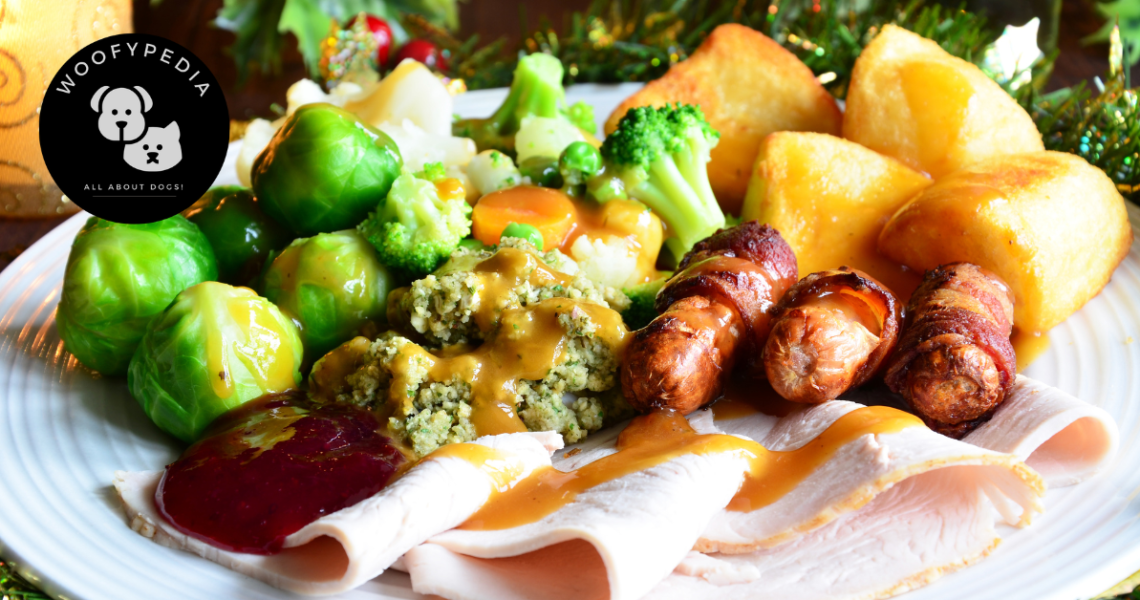Can Dogs Eat Christmas Dinner? Discover the Foods That Are Safe and What to Avoid
Can Dogs Eat Christmas Dinner?
Yes, dogs can eat certain parts of a Christmas dinner, but caution is essential. Plain turkey, carrots, peas, and unseasoned potatoes are safe, while foods like stuffing, gravy, Christmas pudding, and chocolates are harmful. Understanding which festive foods are dog-friendly ensures your pet can join in the celebrations safely.
As a lifelong dog owner and lover of festive feasts, I know how hard it is to resist those big puppy eyes staring up at you from under the Christmas dinner table. Our furry friends are part of the family, and naturally, we want them to join in the celebrations. But not all the delicious food on our plates is safe for dogs—and some of it can be downright dangerous.
In this guide, I’ll walk you through everything you need to know about dogs and Christmas dinner. We’ll look at the traditional dishes—from starters to desserts—and I’ll share tips, tricks, and even some personal anecdotes to help you safely include your dog in the festivities.
Why Sharing Your Christmas Dinner with Your Dog Requires Caution
Let’s face it: Christmas dinner is indulgent. It’s loaded with rich, fatty foods, spices, and sometimes even alcohol. While we humans can handle these excesses (most of the time!), our dogs have very different digestive systems. Foods that are harmless to us can cause anything from mild tummy upsets to life-threatening conditions like kidney failure or pancreatitis in dogs.
But don’t worry—there are safe ways to include your dog in the festive fun. Let’s break it all down, course by course.
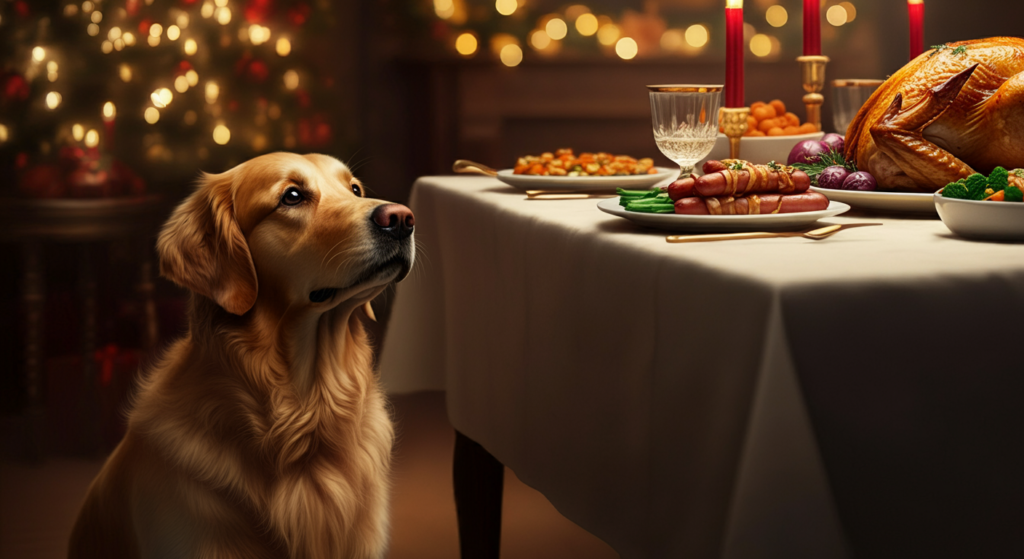
Starter: The Prawn Cocktail Dilemma
Ah, the retro charm of a prawn cocktail! It’s been a Christmas starter in my family for as long as I can remember. But is it safe for your dog?
Are Prawns Safe for Dogs?
Yes, plain prawns can be a healthy treat for dogs. They’re low in fat, high in protein, and rich in nutrients like omega-3 fatty acids, which are great for your dog’s skin and coat. However, the classic prawn cocktail dish is a no-go for pups.
Why Prawn Cocktail Is Unsafe for Dogs
- Cocktail Sauce: The sauce is full of fat, sugar, and salt, thanks to ingredients like mayonnaise, ketchup, and Worcestershire sauce. Some versions even contain onion or garlic powder, both of which are toxic to dogs.
- Seasoning and Lemon Juice: Spices and citrus can irritate a dog’s stomach.
What I Do Instead
If my dog is hovering while I prep prawns, I’ll set aside a few plain, cooked ones before I add the sauce. They’re a treat my dog loves—and it feels good to include her in the celebrations.
For further in-depth information >> Click here to read >> “Can dogs eat prawn cocktail ?”
The Main Course: Christmas Dinner Centrepieces and Sides
Turkey: A Safe Bet (Mostly)
Turkey is usually the star of the show at Christmas dinner, and luckily, it’s one of the safest options for dogs—if you prepare it right.
What’s Good:
- White Meat (Plain): Lean and full of protein, plain turkey is a fantastic addition to your dog’s Christmas plate.
What’s Not:
- Skin: Turkey skin is fatty and often covered in seasoning, which can upset your dog’s stomach.
- Bones: Cooked turkey bones splinter easily and can cause choking or internal injuries.
- Stuffing Residue: If your turkey has been stuffed, traces of onion, garlic, or herbs can make the meat unsafe.
Personal Tip:
I always cook an extra plain turkey breast for my dog. It’s quick to roast separately and keeps her out of the kitchen when the main turkey comes out!
For further in-depth information >> Click here to read >> “Can Dogs Eat Roast Turkey?”
Gammon: A Salty No-No
Gammon is delicious for us, but it’s a big no for dogs. The curing process makes it extremely salty, which can cause dehydration, vomiting, and even salt poisoning in dogs.
If you want your dog to have a festive meat treat, stick with turkey or chicken.
For further in-depth information >> Click here to read >> Can Dogs Eat Roast Gammon?
Pigs in Blankets: Too Tempting, But Dangerous
Who doesn’t love pigs in blankets? Unfortunately, the combination of sausages and bacon is far too fatty and salty for dogs. Even a small piece can upset their stomach or put their pancreas under strain.
For further in-depth information >> Click here to read >> Can Dogs Eat Pigs in Blankets? Discover the Risks and Safe Alternatives!
Stuffing: Packed with Hazards
Stuffing might be the most dangerous part of a Christmas dinner for dogs. Traditional recipes often include:
- Onions and Garlic: Both are toxic to dogs and can damage their red blood cells.
- Sage and Nutmeg: While sage smells lovely, it can irritate a dog’s stomach. Nutmeg is downright toxic.
I learned this the hard way years ago when my childhood dog managed to steal a bit of stuffing. Let’s just say our Christmas Day involved an emergency trip to the vet.
For further in-depth information >> Click here to read >> Can Dogs Eat Stuffing? Find out here!
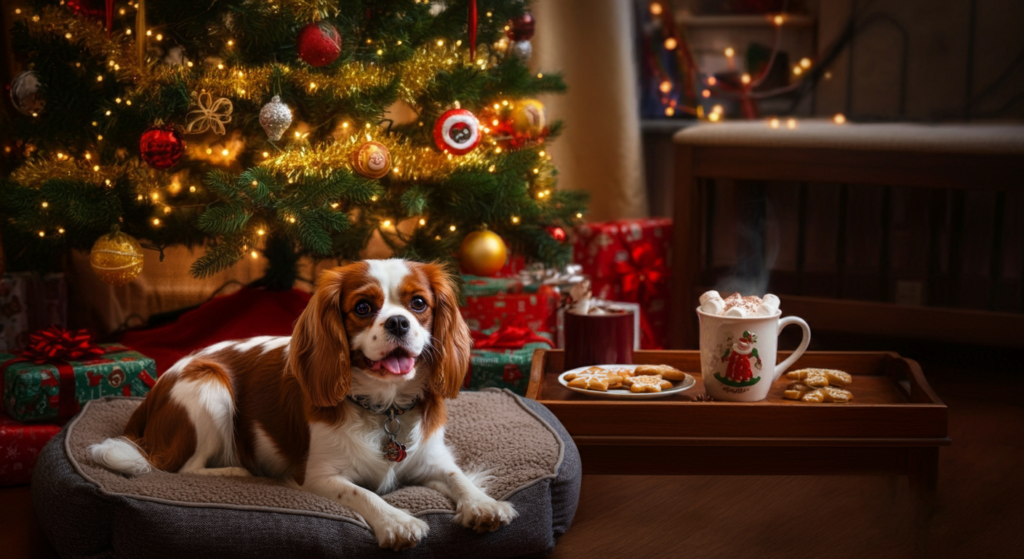
Vegetables: The Good and the Bad
Some veggies on your Christmas plate are fantastic for dogs, while others should stay firmly off their menu.
Dog-Friendly Veggies:
- Carrots: Raw or cooked, carrots are a low-calorie, vitamin-packed snack.
- Parsnips: Sweet and full of fibre, parsnips are another winner.
- Peas: Great for protein and vitamins.
- Brussels Sprouts: Feed in moderation; they’re rich in nutrients but can cause gas.
- Broccoli: Steamed and plain, broccoli is a healthy option.
Click on veggie hyperlink to get more detailed information!
Veggies to Avoid:
- Onions, Garlic, and Leeks: These are all toxic to dogs, even in small amounts.
- Seasoned or Buttered Veggies: Skip anything cooked in fat, salt, or spices.
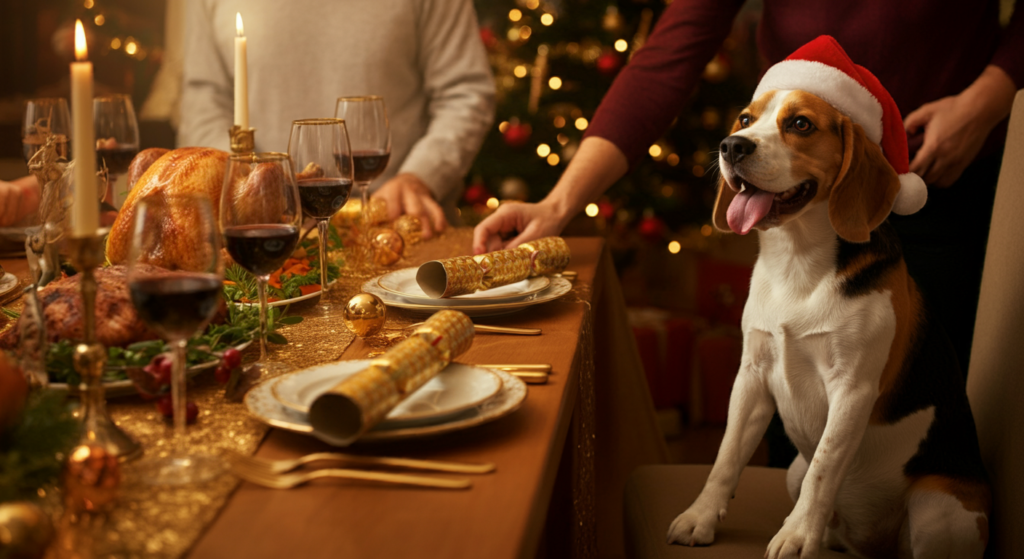
We Must Have Cauliflower Cheese!
Cauliflower cheese is a festive favourite, but unfortunately, it’s not suitable for sharing with your furry friend. While plain, steamed cauliflower is perfectly safe for dogs—and even a nutritious, low-calorie treat—the creamy cheese sauce is another story. Made with butter, milk, and cheese, the sauce is high in fat and can upset your dog’s stomach or even lead to pancreatitis if consumed in large quantities. Additionally, some recipes may include mustard or seasoning, which can irritate your dog’s digestive system.
If your dog’s nose is twitching at the smell of your cauliflower cheese, why not set aside a few plain cauliflower florets before you add the sauce? For an extra treat, toss those plain florets with a little boiled carrot or peas for a dog-safe side dish. Everyone wins!
For further in-depth information >> Click here to read >> Feeding Your Dog Cauliflower Cheese? Read This First!?
Roast Potatoes: A Crispy Danger
While we might love our roasties cooked in goose fat or butter, they’re a no-go for dogs. Fatty, seasoned potatoes can upset their stomach or cause long-term weight issues.
Alternative:
Boil a couple of plain potatoes for your dog. Mashed with no butter, milk, or salt, they make a safe and tasty addition to their plate.
For further in-depth information >> Click here to read >> Are Roast Potatoes Safe for Your Dog? All the Facts Revealed!
Gravy and Condiments: Hidden Hazards
Gravy and festive sauces like cranberry or bread sauce might seem harmless, but they’re packed with salt, sugar, and sometimes even alcohol.
What I Do:
I whip up a quick dog-friendly gravy by blending boiled carrots and peas with a splash of low-sodium chicken stock. My dog loves it!
For further in-depth information >> Click here to read >> Can Dogs Eat Gravy? A Complete Guide for Dog Owners
For further in-depth information >> Click here to read >> Can Dogs Eat Cranberry Sauce?
For further in-depth information >> Click here to read >> Can Dogs Eat Apple Sauce? What You Need to Know Before Feeding It to Your Dog
For further in-depth information >> Click here to read >> Can I give my dog Horseradish Sauce? A guide for owners …
Fancy a Yorkie?
Yorkshire puddings are a staple of many Christmas dinners, but when it comes to sharing them with your dog, it’s best to say no. Made with a batter of flour, eggs, milk, and fat, Yorkshire puddings are too rich and fatty for dogs, especially those with sensitive stomachs. The high dairy and fat content can lead to digestive upset or even pancreatitis if consumed in large amounts. While your dog might be tempted by the smell of these crispy delights, it’s safer to stick to plain, dog-friendly foods like steamed vegetables or lean meats. Keep the Yorkies for yourself and treat your pup to something healthier!
For further in-depth information >> Click here to read >> Can Dogs Eat Yorkshire Pudding? A Guide for Dog Owners
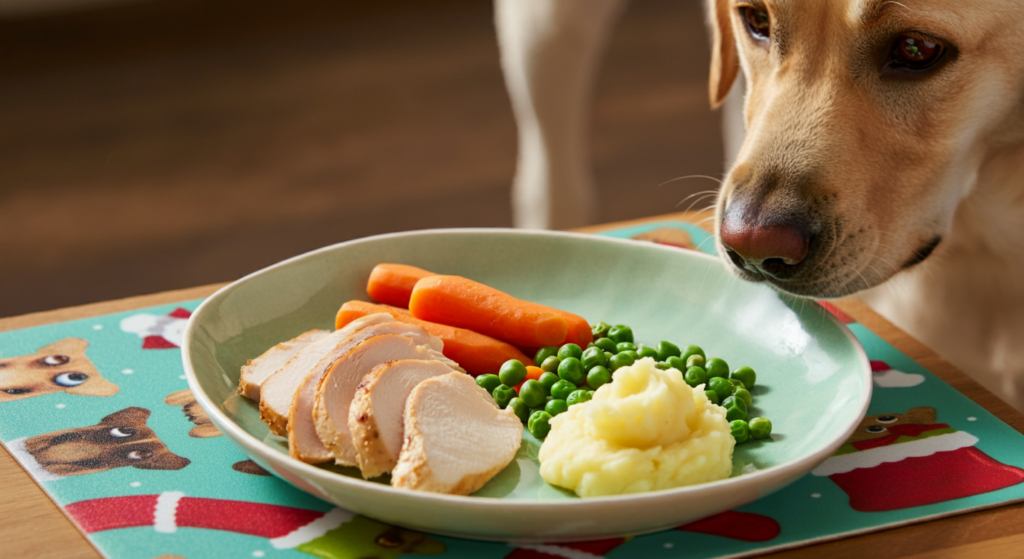
Dessert: Sweet Temptations and Toxic Treats
Christmas Pudding and Mince Pies: Deadly for Dogs
Both of these festive favourites are packed with raisins, currants, and sultanas, which can cause kidney failure in dogs—even in tiny amounts. Add alcohol and sugar to the mix, and they’re doubly dangerous.
For further in-depth information >> Click here to read >> Can Dogs Eat Christmas Pudding? A Guide for Dog Owners
For further in-depth information >> Click here to read >> Can Dogs Eat Mince Pies? Everything You Need to Know
Trifle: A No-Go
Trifle is a sugar bomb with cream, custard, and alcohol-soaked sponge. None of these ingredients are safe for dogs.
For further in-depth information >> Click here to read >> Can Dogs Eat Trifle Safely? Here’s What Every Pet Parent Needs to Know!
Custard and Brandy Butter: Can Dogs Have These Christmas Treats?
Custard and brandy butter are classic accompaniments to Christmas desserts like mince pies, Christmas pudding, and trifle. But are they safe to share with your dog?
Can Dogs Eat Custard?
Custard is not suitable for dogs. While the occasional lick may not cause serious harm, custard contains ingredients that can upset your dog’s stomach.
Why Custard Is Unsuitable:
- Milk and Cream: Most custard recipes include dairy, which can cause digestive issues in dogs, especially those who are lactose intolerant.
- Sugar: High sugar content in custard can lead to weight gain and dental problems over time.
- Vanilla Extract: Some custards include vanilla extract, which contains alcohol—a harmful ingredient for dogs.
Safe Alternative:
If your dog is eager for something creamy, you can offer them plain, unsweetened yoghurt in moderation. It’s lower in sugar and gentler on their stomach.
For further in-depth information >> Click here to read >> Can Dogs Eat Custard?
Can Dogs Eat Brandy Butter?
Brandy butter is a definite no for dogs. This rich, sweet spread poses several risks.
Why Brandy Butter Is Unsafe:
- Alcohol: Brandy is toxic to dogs and can cause symptoms like vomiting, lethargy, or even seizures.
- Butter: High-fat foods like butter can upset your dog’s stomach and increase the risk of pancreatitis.
- Sugar: Excessive sugar content adds further health risks, including obesity and diabetes.
Safe Alternative:
Instead of brandy butter, treat your dog to a small portion of plain, cooked turkey or some dog-friendly biscuits to include them in the festivities.
While custard and brandy butter are delicious for humans, they’re unsuitable for dogs. Both are high in fat and sugar, and brandy butter’s alcohol content is particularly dangerous. To keep your dog safe and healthy this Christmas, stick to plain, dog-friendly treats instead.
For further in-depth information >> Click here to read >> Can Dogs Eat Brandy Butter? A Comprehensive Guide
Chocolates: The Ultimate Danger
Chocolate contains theobromine, which is toxic to dogs. Dark chocolate is especially dangerous, even in small amounts. My neighbour’s Labrador once ate a box of chocolates on Christmas Eve—thankfully, the vet got to him in time.
For further in-depth information >> Click here to read >> Can Dogs Eat Chocolate?
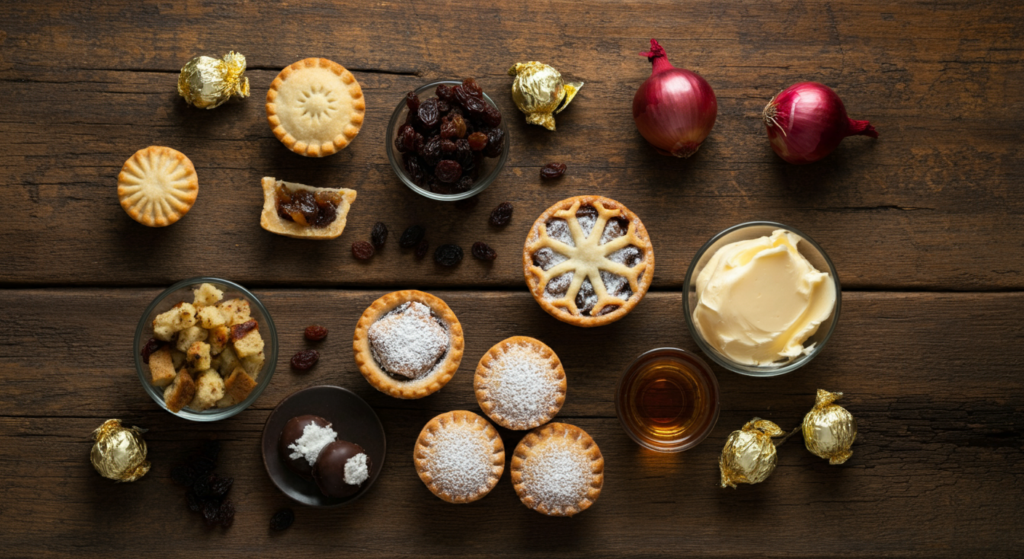
Alternative Christmas Dinner Roasts: Are They Suitable for Dogs?
While turkey is the traditional Christmas roast in many households, alternatives like beef, goose, and duck often make their way to the festive table. If you’re considering sharing these meats with your dog, it’s essential to know how to prepare them safely and what risks to avoid. Let’s take a closer look at these alternative Christmas roasts.
1. Roast Beef
Can Dogs Eat Roast Beef?
Yes, plain roast beef is safe for dogs in moderation. It’s an excellent source of protein and iron, which help maintain muscle mass and red blood cell health. However, it must be prepared specifically for your dog to avoid potential risks.
Things to Avoid:
- Seasoning: Salt, garlic, and onion are commonly used in beef preparations but are harmful to dogs.
- Fatty Cuts: Too much fat can upset your dog’s stomach or lead to pancreatitis.
- Gravy: Traditional gravy often contains salt, fat, and onion, all of which are unsafe for dogs.
Safe Serving Tip:
Offer your dog a small portion of plain, cooked beef, trimming away excess fat and ensuring it’s unseasoned.
For further in-depth information >> Click here to read >> Can Dogs Eat Roast Beef? A Complete Guide for Dog Owners
2. Roast Goose
Can Dogs Eat Roast Goose?
Roast goose is less suitable for dogs compared to other meats. It is much fattier, which increases the risk of pancreatitis or digestive upset. Goose also tends to be heavily seasoned with herbs, spices, and citrus, making it even more unsafe for dogs.
Things to Avoid:
- Goose Skin: Extremely high in fat.
- Seasoning and Marinades: Common ingredients like garlic, onion, and citrus can be toxic to dogs.
Safe Serving Tip:
If you choose to share goose, offer a very small piece of plain, cooked meat (no skin) and ensure there’s no seasoning.
For further in-depth information >> Click here to read >> Can Dogs Eat Roast Goose?
3. Roast Duck
Can Dogs Eat Roast Duck?
Duck can be a safe treat for dogs when prepared carefully, but it should be given sparingly due to its high fat content. Like goose, duck is often cooked with rich seasonings, making most traditional preparations unsuitable for dogs.
Things to Avoid:
- Fatty Cuts: High-fat content can cause digestive issues or pancreatitis.
- Seasoning: Spices and marinades are harmful to dogs.
Safe Serving Tip:
Remove the skin and any visible fat, and serve your dog a small piece of plain, cooked duck.
For further in-depth information >> Click here to read >> Can Dogs Eat Roast Duck? Discover the Risks and Benefits Today!
Sharing Alternative Christmas Roasts with Your Dog
Of these three alternatives, plain roast beef is the best option for dogs due to its leaner nature and versatility. Goose and duck are generally too fatty to be ideal, but small, unseasoned portions may be safe for special occasions. Remember to avoid bones, seasoning, and rich accompaniments like gravy to keep your dog happy and healthy this Christmas.
If you want your dog to enjoy a festive feast, consider preparing a separate dog-friendly meal featuring plain turkey or chicken instead. Your furry friend will still feel like part of the celebrations without any risk!
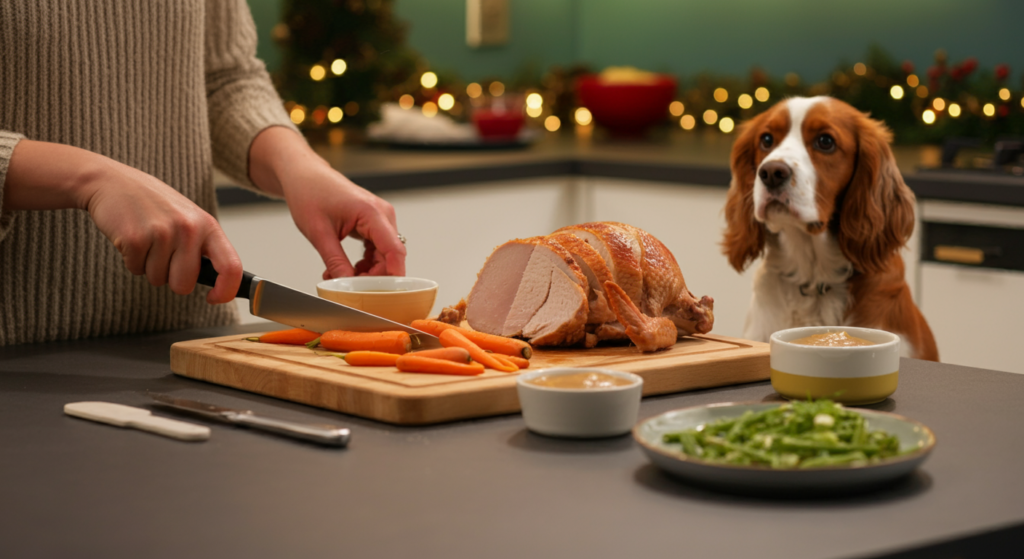
How to Create a Dog-Friendly Christmas Dinner
Want to let your dog join in the fun without worrying about their health? Here’s a simple recipe for a festive dog-friendly meal.
Ingredients:
- Plain cooked turkey (boneless, skinless)
- Steamed carrots and peas
- Boiled potato (mashed with no butter or milk)
Instructions:
- Cut the turkey into bite-sized pieces.
- Combine the turkey, carrots, peas, and mashed potato in a festive dog bowl.
- Serve and watch their tail wag!
What to Do If Your Dog Eats Something Unsafe
Accidents happen, especially during the chaos of Christmas. If your dog sneaks something they shouldn’t, here’s what to do:
- Identify the Food: Note what they ate and how much.
- Watch for Symptoms: Look out for vomiting, diarrhoea, lethargy, or restlessness.
- Call Your Vet: Explain the situation and follow their advice.
- Secure Dangerous Foods: Store harmful foods out of reach to avoid repeat incidents.
FAQ: Can Dogs Eat Christmas Dinner?
Here’s a comprehensive list of frequently asked questions about whether dogs can safely partake in Christmas dinner. These cover everything from specific foods to preparation tips and emergency advice.
1. Can dogs eat turkey from Christmas dinner?
Yes, dogs can eat plain, cooked turkey without seasoning, skin, or bones. Turkey is a great source of lean protein, but the skin is fatty and often seasoned, which can upset their stomach. Always remove bones, as they can splinter and cause choking or internal injuries.
2. Is gammon safe for dogs?
No, gammon is not safe for dogs. The high salt content in gammon can lead to dehydration, vomiting, and even salt poisoning. It’s best to avoid feeding gammon to your dog altogether.
3. Can dogs eat pigs in blankets?
No, pigs in blankets are unsuitable for dogs. The combination of bacon and sausages makes them too fatty and salty, which can lead to pancreatitis or kidney strain.
4. Are roast potatoes safe for dogs?
It depends. Plain, boiled, or mashed potatoes without butter, milk, or seasoning are safe for dogs in moderation. However, traditional roast potatoes cooked in goose fat, oil, or butter are too fatty and should be avoided.
5. What vegetables from Christmas dinner can dogs eat?
Dogs can safely eat plain, steamed, or boiled:
- Carrots
- Parsnips
- Peas
- Brussels sprouts (in moderation)
- Broccoli
Avoid vegetables cooked with butter, salt, or seasoning, and steer clear of onions, garlic, or leeks, as they are toxic to dogs.
6. Can dogs eat stuffing?
No, stuffing is not safe for dogs. It often contains toxic ingredients like onions, garlic, and nutmeg. Even stuffing made without these can be too fatty or salty for dogs.
7. Is gravy safe for dogs?
No, traditional gravy is unsuitable for dogs because it is high in salt, fat, and sometimes contains onion or garlic. Instead, you can make a dog-friendly gravy by blending plain, boiled vegetables with low-sodium chicken stock.
8. Can dogs eat cranberry sauce or bread sauce?
No, sauces like cranberry or bread sauce are not safe for dogs. Cranberry sauce is often sweetened with sugar, and bread sauce contains milk, butter, and seasoning, all of which can upset a dog’s stomach.
9. Can dogs have Yorkshire puddings?
No, Yorkshire puddings are made with milk, flour, and fat, which are not suitable for dogs. Dairy can cause digestive issues, and the fat content is too high.
10. Can dogs eat Christmas pudding or mince pies?
Absolutely not. Both contain raisins, currants, and sultanas, which are highly toxic to dogs and can cause kidney failure. They also often contain alcohol, sugar, and spices that are harmful.
11. Is chocolate from the dessert table safe for dogs?
No, chocolate is toxic to dogs. It contains theobromine, which can cause vomiting, seizures, or even death. Dark chocolate is particularly dangerous due to its high theobromine content.
12. Can dogs eat trifle or custard?
No, trifle and custard are not safe for dogs. Both are high in sugar and fat, and trifle often contains alcohol-soaked sponge, which is toxic.
13. What is the best way to create a dog-friendly Christmas dinner?
Prepare a separate plate with:
- Plain cooked turkey (boneless and skinless)
- Steamed carrots, peas, or parsnips
- Mashed or boiled potatoes (no butter, milk, or salt)
Serve it in a festive dog bowl to make your pup feel special!
14. Can dogs eat leftovers from Christmas dinner?
Leftovers can be safe for dogs, but only if they are plain and unseasoned. Avoid fatty, salty, or spiced foods, and never give leftovers containing onions, garlic, raisins, or chocolate.
15. How much Christmas food can I give my dog?
Treats from Christmas dinner should make up no more than 10% of your dog’s daily caloric intake. Overfeeding, even safe foods, can lead to weight gain or digestive issues.
16. What should I do if my dog eats something unsafe from Christmas dinner?
If your dog eats something toxic (e.g., chocolate, onions, raisins), follow these steps:
- Identify what and how much they ate.
- Watch for symptoms like vomiting, diarrhoea, or lethargy.
- Contact your vet immediately for advice.
- Prevent further access to harmful foods.
17. Are there festive treats specifically made for dogs?
Yes! Many brands offer dog-safe Christmas treats, biscuits, and even festive meals.
18. Can dogs eat cheese from the Christmas cheese board?
In small amounts, plain, low-fat cheese can be a treat for dogs. However, many cheeses are high in fat and salt, and blue cheeses contain moulds that are toxic to dogs. Offer cheese sparingly, if at all.
19. Are there Christmas drinks dogs can share?
No, dogs should not consume alcohol, caffeinated beverages, or sugary drinks. Even small amounts of alcohol can be toxic to dogs. Stick to fresh water to keep them hydrated.
20. Is it safe to let my dog sit near the Christmas table?
It’s fine as long as the table is supervised, and foods within reach are safe. To avoid temptation, you might want to feed your dog their festive meal beforehand or give them a chew toy during the meal.
This FAQ covers the most common concerns about dogs and Christmas dinner. By staying informed and planning ahead, you can safely include your furry friend in the festivities!
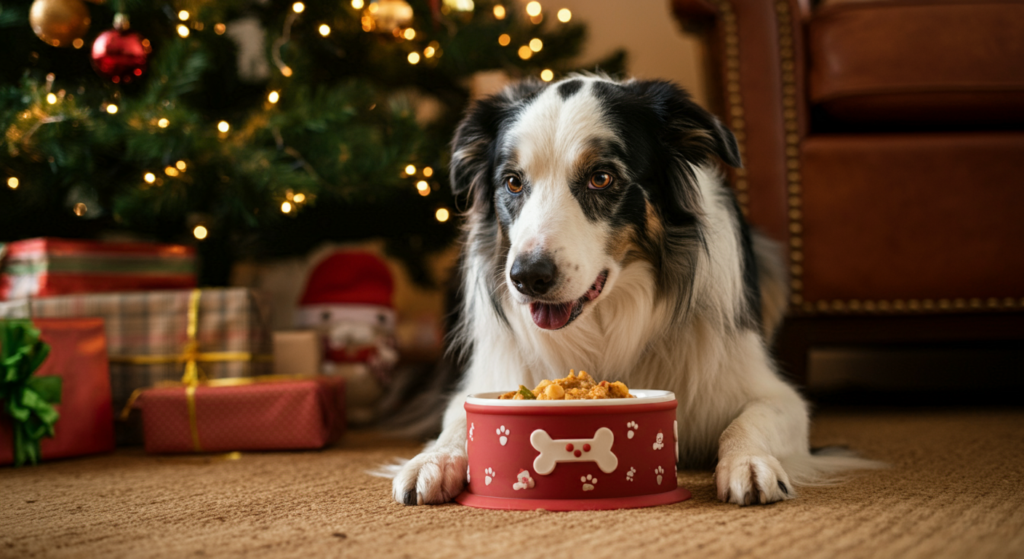
Final Thoughts: Including Your Dog in Christmas Safely
Christmas is a time for family, and that includes our beloved dogs. With a little planning, you can safely include your furry friend in the celebrations. Stick to plain, unseasoned foods, avoid anything fatty, sugary, or spiced, and remember: those big puppy eyes are always watching, so keep the mince pies well out of reach!
Here’s to a happy, safe, and wag-filled Christmas for you and your pup! 🎄🐾
